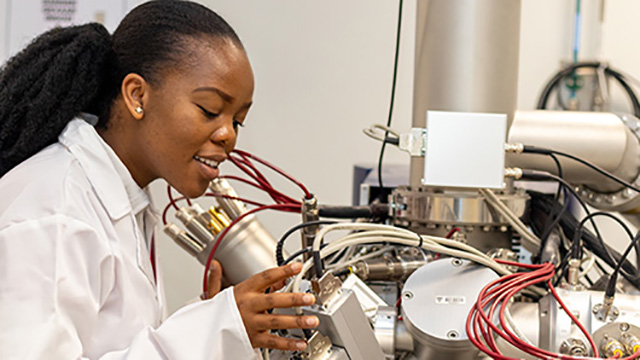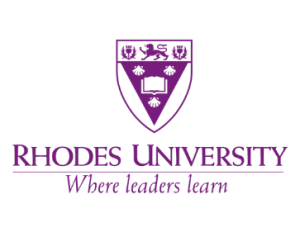“A conduit for collaboration and cutting-edge research produced in excellence.” This is how students have described Rhodes University’s Tebello Nyokong Institute for Nanotechnology Innovation (TN-INI). The pioneering research facility, which has already cemented its role as a driving force in Africa’s scientific development, will unveil its brand-new custom-designed building on 03 December 2024.
The new INI building offers state-of-the-art technology and purpose-built research facilities tailored to advance and optimise nanotechnology studies. Nanotechnology is a field of science and engineering that focuses on the design and manufacture of extremely small devices and structures on the scale of atoms.
Described as a “one-stop shop” and the only facility of its kind on the continent, the INI is led by Distinguished Professor Tebello Nyokong, a globally recognised expert in the field of nanotechnology.
 Rhodes University Professor Philani Mashazi said the project grew from humble beginnings: “INI started 30 years ago as a laboratory with one postgraduate student. Today, we have, on average, 34 students.”
Rhodes University Professor Philani Mashazi said the project grew from humble beginnings: “INI started 30 years ago as a laboratory with one postgraduate student. Today, we have, on average, 34 students.”
With a strong focus on research, every INI graduate has an international footprint as they are equipped with the tools of and exposure to world-class scientists and scientific instruments.
Dr Iain L’Ange, Rhodes University’s Infrastructure Consultant, said the new facility was designed to support African researchers through scholarships and international collaborations, while also housing cutting-edge scientific instruments.
The move required a great deal of skill and intricate planning with a helicopter used to transport sensitive scientific instruments.
The new INI facility offers an integrated environment, with all the research instruments and research spaces housed under one roof. Scientific researchers and postgraduate students will benefit from reduced time spent moving between machines, fewer distractions, and more opportunities for productive interaction with colleagues. This efficiency will lead to faster turnaround times in producing cutting-edge research.
One of Professor Nyokong’s former students, Nnamdi Nwahara, now a Postdoctoral Fellow believes the new INI building signals a paradigm shift. “The ChemPharm building was where I first cut my teeth in research. It had a certain charm – familiar and functional, but the new INI building feels like a game-changer. With its open design and large glass windows, you can see researchers working from the outside, which feels like a deliberate attempt to connect the science happening inside with the real world,” Nwahara said.
In addition to the efficient workflow design, the new building is equipped to handle potential power outages or disruptions. A high-level generator, supported by uninterruptible power supply (UPS) systems, ensures that all research instruments remain operational during power transitions.
Professor Mashazi said the facility symbolises South Africa’s role as a hub for scientific discoveries and innovations with global significance.
“This building is a tribute to the decades of ground-breaking work by Professor Nyokong, her many students and international collaborators,” he said.
Nwahara echoed the sentiment, saying that seeing the INI building named after Professor Nyokong feels “deeply personal” to him.
“I have been under her supervision from my honours degree to my PhD. Her dedication to science and to nurturing young researchers like myself has left a lasting impact. It’s wonderful to see her legacy honoured in this way.”
Former student Sixolile Centane, also now a Postgraduate Fellow, highlighted the significance of the INI for the future of scientific research at Rhodes University and beyond.
“The Institute is our GPS; if you are looking for excellence, competence, hard work, dedication, and legacy, you will definitely find it at the Tebello Nyokong Institute for Nanotechnology Innovation in a small town called Makhanda in the Eastern Cape.”
Professor Nyokong is humbled at the honour of having the INI named after her. However, she understands that the true life of the building is in its people. She is hoping that the values she has poured into her students will empower them to pass on the baton.
“When I mentor my students, I give them not just knowledge, but also the care and support they need to become the best versions of themselves. You cannot achieve greatness unless you are nurtured along the way. I hope that through this work, I have helped to shape leaders who will make meaningful contributions to our country and to our continent,” said Professor Nyokong.
The INI’s efforts are not only focused on producing high-quality research but also on translating scientific findings into practical solutions. By developing products, technologies, and innovations that can be commercialised, the Institute is poised to make a lasting impact on society.
Professor Mashazi has outlined the Institute’s vision, saying they hope to play a role in shaping policy and applying scientific discoveries to real-world challenges.
“Our focus will remain on nanotechnology, but we aim to play a broader role — particularly in policy-making and translating innovations from the lab to communities. We want to move our research into practical applications, bringing tangible benefits to people,” he said.
INI is also committed to training the next generation of nano-scientists and technologists, ensuring the continued growth of expertise in this dynamic field.
Rhodes University Vice-Chancellor, Professor Sizwe Mabizela said he was proud of Professor Nyokong’s years of ground-breaking intellectual contributions, tireless dedication, and unwavering commitment to Rhodes University.
“As a Distinguished Professor, her remarkable achievements and contributions to research place her in a league of her own. We are incredibly proud of her work, not only for advancing the University’s research output but also for making a significant impact on our country and the global scientific community.”
Professor Mabizela added that the INI building represents a monumental leap forward for Rhodes University and the African continent.
“It is more than just a state-of-the-art facility — it is a symbol of our commitment to advancing science and innovation at the highest level. This building stands as a testament to the excellence we strive for and our belief in the power of knowledge to transform society. With this new facility, we are paving the way for groundbreaking discoveries that will have a lasting impact on our communities, our country, and the world.”
The below picture shows the new INI building when it was still in the process of being built.


